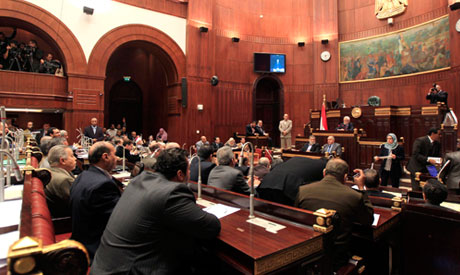
Members of Egypt's constitution committee meet at the Shura Council for the final vote on Egypt's new constitution in Cairo November 29, 2012. (Photo: Reuters)
After a 14-hour marathon of voting, the Islamist-dominated Constituent Assembly approved the final draft of Egypt’s new constitution. At 6.30am local time on Friday, as Egypt's national anthem played in the background, assembly chairman Hossam El-Ghiryani announced that the final draft of the constitution had been approved by the overwhelming majority of members attending the session (85 out of 100).
El-Ghiryani also disclosed that the draft would be handed over to President Mohamed Morsi on Saturday afternoon. He urged assembly members to accompany him to the presidential palace to give Morsi the draft, calling on secular members who boycotted the assembly’s final debates to join them. El-Ghiryani said the introduction of the constitution would be written by him, and that the printing of the final charter would be done by the culture ministry.
"The draft will include all the final amendments introduced by members on Wednesday and Thursday...and the people can read it carefully before it is put to a vote in a national referendum," El-Ghiryani said.
Islamists who make up the majority of the assembly rallied behind El-Ghiryani, staying awake until dawn to ensure that the final draft was approved by an overwhelming majority.
The session was held in the hall of the Shura Council (the upper, consultative house of Egypt's parliament) under a heavy security presence. According to one member, the buildings of the People's Assembly (the lower house of parliament) and Shura Council were temporarily transformed into "an army fortress."
In their final hours, the debates passed through some difficulties.
Al-Azhar representative to the assembly Hassan El-Shafie threatened to withdraw when some Muslim Brotherhood members accused Al-Azhar's grand imam of being a remnant of the ousted Mubarak regime and defunct ruling National Democratic Party (NDP). El-Ghiryani implored El-Shafie not to walk out, arguing that "the Grand Imam of Al-Azhar Sheikh Ahmed El-Tayeb was one of several high-profile national figures who resigned from Mubarak's NDP."
"When he, as president of Al-Azhar University, was appointed by Mubarak to the NDP’s politburo, he went there for just one time then decided to resign. This was an honourable step by Al-Tayeb," said El-Ghiryani.
El-Shafie objected strongly to a draft article aimed at stripping former leading NDP officials of playing a political role for ten years. In the words of El-Shafie, "I'm not in favour of imposing political disenfranchisement on any figures as long as they were not found guilty of political corruption; it is unfair for the constitution to ostracize a certain segment of society." Agreeing, El-Ghiryani said: "We don't want Egypt's new democratic constitution to be designed to take revenge on certain politicians."
El-Shafie and El-Ghiryani’s sentiments faced objections from the Muslim Brotherhood and Salafists, who insisted that the political disenfranchisement article be included in the constitution. Proposed by Hatem Azzam, an independent close to the Brotherhood, the amendment – which was approved by the majority of assembly members – imposes a political ban on former members of the NDP's politburo, secretariat-general, Policies Committee (which had been led by Mubarak’s son, Gamal) and all who had been members of the NDP up until 25 January 2011.
According to Azzam, the implementation of this constitutional article will cause up to 1500 former NDP members to be banned from exercising any political activities for ten years.
In another direction, El-Ghiryani directed a blow to journalists when he refused an amendment aimed at preventing journalists from facing jail sentences for publication offences. El-Ghiryani refused to discuss the article at the beginning of debates on Wednesday afternoon, but promised press syndicate chairman Mamdouh El-Wali to discuss it later. He postponed the article until the very end, at 6am Friday morning.
When it came to discussion, El-Ghiryani told Al-Wali: "I did not give any promises to you; the final word should be left to members." The amendment was rejected by 80 out of 85 members. They also rejected amending article 215, which states that a national media authority be set up to supervise print, satellite television, and digital electronic media.
While the assembly’s Islamist majority voted in favour of imposing jail sentences on journalists in publication offences, they welcomed an amendment reserving 50 per cent of the seats in parliament to representatives of workers and farmers. The amendment, introduced by the Muslim Brotherhood’s Minister of Manpower Khaled Al-Azhar, states that this quota would be applied for just one parliamentary session (five years), after which it would be phased out completely.
The amendments also set a new definition for workers and farmers. According to the draft constitution, a worker is one employed by public or private institutions or individuals, while a farmer is one who has practiced agricultural activities for at least ten years.
The Islamists also rallied behind article 219, devoted to the interpretation of the principles of Islamic Law. This new article, pressed for hard by Salafists, was the major factor leading secularists and representatives of the church to withdraw from the assembly. They warned that this article opened the door to radical interpretations of Islam and threatened to turn Egypt into an extremist nation. The article states that the principles of Islamic Law include its most fundamentalist interpretations.
President Morsi is expected to put the final draft of the constitution to a vote within two weeks.
Short link: